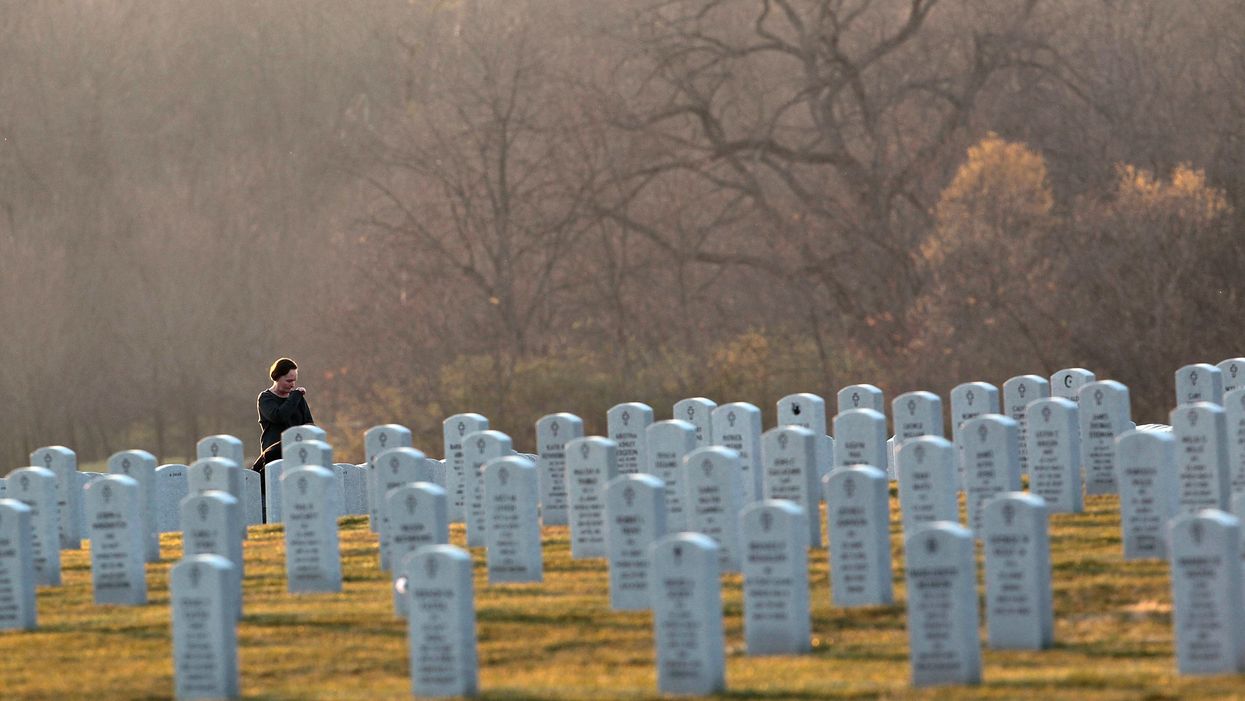
Photo by Scott Olson/Getty Images

Incredible
America magazine profiled an all-boys school in West Roxbury, Massachusetts, for its practice of holding funerals for homeless veterans.
America contributor Michael Kotsopoulos, who works at the school, detailed his recent experience at one of these funerals and how it moved him. He told of his somber encounter at the school:
I am greeted by a wooden casket hoisted on the shoulders of eight high school basketball players as I enter the lobby of Catholic Memorial School in early January. An American flag covers the casket. At 8 a.m., I expect a tired expression across the face of each young man and wonder how they will navigate the halls to the narrow chapel.
Kotsopoulos went on to recall what vice principal Tom Ryan told him and the rest of the faculty on his first day of work at the school.
"If you want to let a student know that they're loved, call them by their name," he recalled Ryan saying. "After all, someone loved them enough to give them one."
When a person calls someone by their name, it shows the person that they matter — that they exist in the eyes of at least one other person. But what happens when nobody knows their name? And what happens when those who knew it no longer exist? Who reminds them of their own dignity then?
Kotsopoulos attended the funeral of homeless U.S. Army veteran Timothy Fowl, a man whom nobody seemed to know. Kotsopoulos and his peers did know, however, that Fowl passed away at the Brockton VA Hospital in Worcester, Massachusetts, and that he'd spent six years of his life in the Army as a medical specialist.
Fowl reportedly worked as a welder in the years following his discharge, but then fell on hard times, and, according to Kotsopoulos, left behind no known friends or family and "received no heartfelt goodbyes."
Eight members of the school's basketball team carried the casket for an American service member that they never met.
School President Peter Folan eulogized Fowl.
"Here at C.M., we're a family," he said. "A proud family. We're a community that welcomes people in and accepts them for where they are. We ask them to join us on our journey toward being more, doing more and caring for others."
"Timothy Fowl, welcome to our family," Folan added.
Kotsopoulos wrote that few people knew Fowl at the time of his death, but as President Folan "listed off his military service and the significance of his duty, a room full of young men began to understand what the name Timothy Fowl meant. To them, it meant sacrifice for one's country. It meant service. It meant bravery. With that, every student left school that day keeping Mr. Fowl's memory alive."
According to Kotsopoulos, in 2017 the director of campus ministry — Kevin Durazo — started the tradition of providing funerals for veterans with no known living loved ones or friends.
"The school considers it a part of its mission to welcome those on the margins into their community — an active and engaging way for an adolescent to understand the concept of empathy," Kotsopoulos wrote. "At C.M., serving means to walk with, not ahead of, another. Though students collectively complete over 15,000 hours of required service work each year, they do not receive hours for their participation in the funeral."
Kotsopoulos revealed that Durazo coordinates with a local funeral home and invites different school groups to host funeral services for the various veterans.
"The school partners with Lawler and Crosby to coordinate the casket, hearse, and transportation needed for the burial at the veterans' cemetery in Winchendon, [Massachusetts]," Kotsopoulos said.
In retrospect, Kotsopoulos said that services of this type leave profound impressions on the boys' minds.
"As a Christian Brothers school, C.M. prioritizes Jesus' seven corporal works of mercy in its active service to others," he wrote. "These works instruct us to feed the hungry, give drink to the thirsty, shelter the homeless, visit the sick, visit prisoners, give alms to the poor, and bury the dead."
He continued:
During these funeral services in the chapel, our students learn what it means to welcome someone on the margins into their family. They give shelter, visit the sick and bury the dead. They learn how to empathize with the suffering of others and to see a stranger as their brother.
And it starts with learning his name.